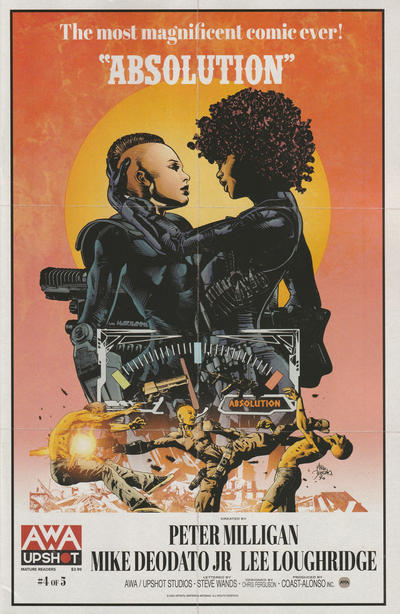In case you need a break and to briefly take your mind off the news, for some reason, here is another post about scattered comics that I associate with just the kind of offbeat genre stuff this medium excels at. Too esoteric or visually wild to pull off in cinema or streaming, these aren’t necessarily masterpieces, but they sure are COMICS!
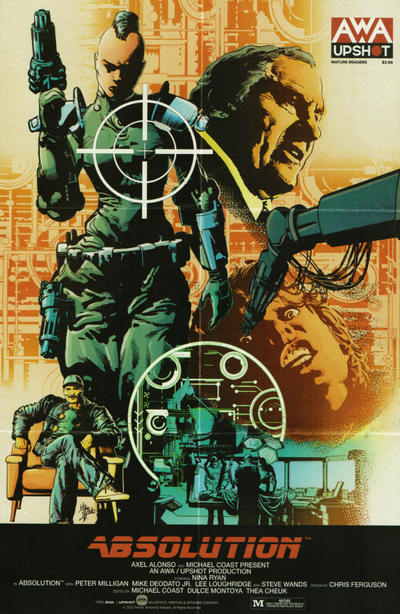
ABSOLUTION
Understandably, these have been great times for dystopic social media satires and there are others I could’ve picked (like the hilarious Death Ratio’d), but I particularly like how Absolution engages with the readers’ own contradictions. Its premise is that, in a near future, criminals get to earn absolution by going on live-streamed killing sprees while receiving votes – and outrageous comments – from the public. And so, on the one hand, we get to delight in thrilling cyberpunk violence courtesy of Mike Deodato Jr (whose layouts are full of tight rectangular grids, simulating our screen-watching POV) and Lee Loughridge (whose neon colors likewise evoke the glare of digital devices), and on the other hand, a panel of pundits and experts (along with the protagonist’s inner monologue) reflexively discuss bloodthirsty voyeurism and the ethical implications of vigilante justice. In other words, Absolution somehow works as a kickass proto-Punisher yarn as well as a provocative anti-Punisher comic!
It’s the kind of balancing act few writers can pull off, but Peter Milligan has spent a decades-long career exploring identity dilemmas in various genres, drawing on both high and lowbrow references. His work has often displayed a knack for merging hardboiled fiction with absurdist humor – and Absolution is no exception (even if the somewhat deadpan result isn’t nearly as manic and inventive as Johnny Nemo, Milligan’s previous strip about an ‘existentialist hitman of the future’).
BENEATH THE TREES WHERE NOBODY SEES
One of the most breathtaking debuts in ages, Patrick Horvath’s Beneath the Trees Where Nobody Sees is a masterclass in how to take a pretty basic high concept and deliver a damn knockout comic that feels much better than it had any right to be! The premise of a clash between rival serial killers isn’t the most original, although the twist here is that it takes place in a small town with *the* *most* *adorable* anthropomorphic creatures. And sure, Horvath is also not the first to play off the contrast between, on the one hand, innocent-looking visuals and concepts that seem straight out of a children’s book and, on the other hand, utterly grueling violence…
What could’ve been a mere edgelord dark comedy, though, is elevated by the care that clearly went into all facets of this book. From the designs and mise-en-scène to the light-as-a-feather colors and pitch-perfect lettering (by Hassan Otsmane-Elhaou), every single page of BTTWBS looks stunning. What’s more incredible is that the shamelessly manipulative use of cute animals, coupled with some deft characterization, totally works: not only does the gore come across as shocking and terrifying, but the psychopathic protagonist is somehow quite likeable.
BLACK WIDOW: DEADLY ORIGIN
This one is a bit older, but it fits the spirit… Deadly Origin is a high-octane spy-fi mini-series with cartoony artwork by Tom Raney and Scott Hanna, spliced with flashback snapshots – beautifully rendered and colored by John Paul Leon – covering the Black Widow’s very long life (she was born in 1928 and has extended her youth through a fantastic/convenient serum). Clearly designed to do some house-cleaning on the character’s contradictory continuity, the comic turns this challenge into a virtue, as Paul Cornell writes in his signature frenzied style, cramming new twists and information into practically every panel (the opening sequence is already relentless), so that part of the fun is precisely trying to keep up with the sheer barrage of Marvel cameos and plot threads. It helps that the main story’s framing device is itself quite wacky (it involves sexually transmitted nanites) and it’s interesting to see that, because the original series came out in 2010, Russia’s secret services still come off more like the technologically outdated remnants of a former great empire than like a cutting-edge cyber-threat with renewed expansionist designs.
The series was collected into a single book and it’s also included in the larger collection Black Widow: Widowmaker.
GRIZ GROBUS
A tomb raider on a colonized planet tries to steal a neuro-processor and ends up resurrecting a robot priest. A distracted wizard in a swords-and-sorcery world tries to conjure up a war god and, amusingly, messes up even worse. Writer-artist Simon Roy initially throws readers into these two realities without establishing their odd settings (or explaining how they are connected) and, in this day and age of endless origins, prequels, and dumbed-down exposition, I have to admit it feels damn refreshing when a creator trusts us to just jump on board for the ride and fill in the necessary blanks along the way. And so, you can add the joy of discovery to the joy of the adventure itself. Remember the opening of Raiders of the Lost Ark, which felt like walking into the middle of an ongoing serial and was all the better for it? Same here: Roy and Jess Polard (credited as co-plotter and script editor) have come up with full worlds and rounded characters rich in backstory which we get to know – insofar as it matters – as they bond and fight and eat… (Food, in particular, plays quite a central role in both tales, which is the sort of relatable element that helps ground the fantasy.)
Since Griz Grobus’ storytelling relies so much on action and offhand remarks in the dialogue, the artwork needs to be especially efficient and expressive. Roy’s drawings – with more than a touch of anime influence – do the job and are well-served by Sergey Nazarov’s smooth colors, which nail a distinct visual identity for each of the two parallel narratives.
KNOW YOUR STATION
You get no points for guessing why the premise of 1%-style ultra-rich people fleeing from an economically and ecologically devastated Earth has inspired so many gonzo variations in recent comics. Along with the sci-fi setting’s visual possibilities, the concept has an obvious satirical dimension (not least by condensing the radical discrepancies between haves and have-nots within a self-contained space) that creators have explored through their individual sensibilities, from Van Jensen’s awesome-looking Arca and Stefano Cardoselli’s trippy Don’t Spit in the Wind all the way to Mark Russell’s and Steve Pugh’s funny Billionaire Island…
Sarah Gailey’s and Liana Kangas’ contribution to this subgenre, Know Your Station, kicks off as a locked room whodunnit inside a space station/oligarch resort, with the added twist that the investigator isn’t your usual master detective, but rather an unprepared, drug-addicted ‘security liaison’ with unreliable memory and the constant impression that she might be way over her head. This leads not only to in-your-face social commentary, but also to some nifty surprises as the resolution gleefully subverts the stakes of this type of murder mystery tale.
ZAROFF
Remember Richard Connell’s classic short story ‘The Most Dangerous Game,’ from way back in 1924? You know, the one about a hunter who literally becomes the hunted on an island where a madman kills humans for sport? Even if you haven’t read it, I’m sure you’ve seen one of the film adaptations or one of its endless variations… And even if you haven’t, you don’t really need much background to get a kick out of Zaroff, a sequel set eight years later, in 1932, and, wisely, focusing not on the original’s boring hero but rather on its deranged villain!
It may seem odd to include in a list of comics that are COMICS an album that 1) is a follow-up to a prose story, and 2) looks incredibly ‘cinematic’ in its rhythmic editing and photo-naturalistic aesthetics. And yet, this is actually a majestic example of what you can do with drawings on paper… Sylvain Runberg clearly scripted the book to serve François Miville-Deschênes’ artwork, as most of it is just a relentless succession of action set pieces, letting him fill the book with impressively rendered vistas and thrilling adventure beats. The plot feels almost nihilistic, with a bunch of vicious characters fighting each other to the death on a jungle, the contrast with their elegant period clothes somehow giving the whole thing even more of a lurid grindhouse feel. The thing is that Miville-Deschênes’ layouts are so graceful that they create a quirky sort of tension: on the one hand, the dynamic pace makes one want to speed through the whole thing; on the other, each page is so gorgeous on its own that I just want to contemplate it at length.
The creative duo reunited for a sequel to this sequel, Zaroff’s Revenge, which jumps to the early 1940s. The tone gets even bleaker there, as they pit these games of hunted humans against a much larger version of the same game: World War II. I wouldn’t be surprised if this turns out to be Garth Ennis’ favorite comic!
